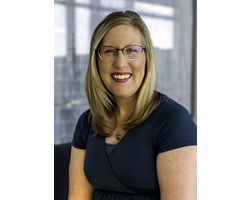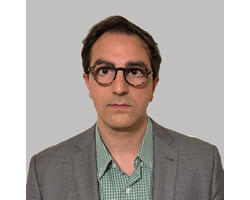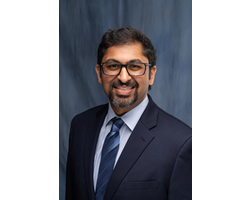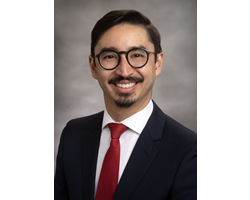
Alexandria McDow, MD, FACS
Assistant Professor of Surgery
Trustees of Indiana University
Bloomington, IN
Clinical – Autoimmunity
“Randomized Controlled Trial of Preoperative Corticosteroids in Autoimmune Thyroid Disease”
Dr. McDow’s research focuses on endocrine surgery, with particular interest in surgical decision-making in patients with benign and malignant thyroid disease.
Dr. Alexandria McDow is a native of Kentucky, receiving her M.D. from University of Kentucky College of Medicine. She did her residency in general surgery at Southern Illinois University and completed a fellowship in endocrine surgery at University of Wisconsin School of Medicine and Public Health. She is an American Board of Surgery certified general surgeon and fellowship trained endocrine surgeon. She joined Indiana University School of Medicine in 2019 as an Assistant Professor of Surgery in the Division of Surgical Oncology within the Department of Surgery. Her clinical focus specializes in the treatment of benign and malignant diseases of the thyroid, parathyroid, and adrenal glands. Her research focuses on endocrine surgery, with particular interest in surgical decision-making in patients with benign and malignant thyroid disease. She is passionate about surgical education and serves as the Associate Director of the Indiana University General Surgery Residency Program. Dr. McDow is a member of the American Thyroid Association, American Association of Endocrine Surgeons, and a Fellow of the American College of Surgeons. She was also awarded membership in Alpha Omega Alpha and the Gold Humanism Honor Society.

Federico Salas Lucia, PhD
Staff Scientist
The University of Chicago
Chicago, IL
Basic Science – Thyroid Hormone Development and the Brain
“Thyroid Hormones Regulate Fetal Neurogenesis”
Dr. Salas Lucia’s research focuses on studying TH transport, metabolism, and action in the context of brain development and function and translating this knowledge into treatment options for patients with hypothyroidism or inherited thyroid diseases.
Federico Salas-Lucia is a translational biologist working as a staff scientist in the Department of Medicine at the University of Chicago. His research centers on understanding thyroid hormone (TH) transport, metabolism, and action in the context of brain development and function and translating this knowledge into treatment options for patients with hypothyroidism or inherited thyroid diseases. His interest in this area was sparked during his PhD, where he delved into the pathophysiology of congenital hypothyroidism, particularly the brain’s vulnerability to TH deficiency during the breastfeeding period. Building on this foundation, he has explored new molecular and cellular mechanisms underlying the ‘local’ customization of TH signaling in the brain. He has discovered a new pathway for TH to enter the neurons residing in the brain, revealing that TH can enter neurons hidden in a cellular shuttle (endosomes) that acts akin to a Trojan horse, protecting TH from degradation. He also established a cellular model–based on cerebral organoids–for studying the pathophysiology of the MCT8-deficiency. Using these MCT8-deficient cerebral organoids, he confirmed a dramatic reduction in TH transport into fetal neural cells, leading to abnormalities in early neurogenesis (the process by which new neurons are formed in the brain). He is also often involved in basic studies focused on TH economy and in studies on human families with inherited thyroid conditions.

Sophia Williams-Perez, MD
Resident Physician
The University of Texas MD Anderson Cancer Center
Houston, TX
Clinical – Medullary Thyroid Cancer
“Cultural Adaptation of an Educational Tool in Medullary Thyroid Cancer”
Dr. Williams-Perez’s research focuses on improving access to and how to culturally adapt reliable information for underrepresented populations diagnosed with medullary thyroid cancer.
Sophia Williams-Perez, MD, is a third-year research resident at Baylor College of Medicine in Houston, Texas who is completing her dedicated two years of research in an NIH-funded T32 research fellowship in Complex General Surgical Oncology at The University of Texas MD Anderson Cancer Center. She is working in the lab of Dr. Elizabeth Grubbs, and her current research is focused upon improving access to and culturally adapting information for medullary thyroid cancer withing underrepresented patient populations. Her additional research interests include surgical education, health disparities, robotic surgery, and quality improvement. She achieved her medical degree from the University of Iowa Carver College of Medicine in Iowa City, Iowa in 2017, where she graduated with Gold Humanism honors and served as the College of Medicine’s Student Body President. Prior to medical school, she completed her undergraduate degree in Biochemistry and Spanish from Wartburg College in Waverly, Iowa while also playing collegiate soccer. Additionally, she currently serves our nation as a Lieutenant in the Navy Reserves, having directly commissioned via the Health Professions Scholarship Program in 2017.

Aditya Shirali, MD
Assistant Professor
University of Florida
Gainesville, FL
Basic Science – Thyroid Cancer (Non-Medullary)
“Characterizing Age-Related Differences in the Tumor Immune Microenvironment in Papillary Thyroid Carcinoma of the Older Adult”
Dr. Shirali’s research focuses on Identifying age-specific differences in the tumor immune microenvironment of papillary thyroid carcinoma that may contribute to increased disease aggressiveness in the older adult.
Aditya Shirali, MD, is a clinical assistant professor with the University of Florida Department of Surgery in the Division of Surgical Oncology. He obtained his bachelor’s degree from Cornell University and graduated from Icahn School of Medicine at Mount Sinai, in New York, New York, where he was awarded the Dr. Arthur H. Aufses Senior Prize in Surgery. Following medical school, he completed a general surgery residency at the University of California, Los Angeles as well as a postdoctoral research fellowship at UCLA in the Broad Stem Cell Research Center. He then completed comprehensive fellowship training focused on thyroid, parathyroid and adrenal surgery at the University of Texas MD Anderson Cancer Center’s Surgical Endocrinology Fellowship Program. He became interested in endocrine surgery because of the multidisciplinary nature of the field and the ability to form meaningful, long-term relationships with his patients.
His clinical interests focus on the practice and advancement of endocrine surgery, particularly through innovative and minimally invasive techniques. He treats benign and malignant thyroid, parathyroid and adrenal disease, including Graves’ disease, thyroid cancer, primary and secondary hyperparathyroidism, nonfunctional and functional adrenal masses, adrenocortical carcinoma and more. He also conducts research that not only focuses on improving our understanding of the molecular profile of endocrine cancers at all stages, but also aims to provide personalized, patient-centered surgical care and postoperative therapies.

Thomas Szabo Yamashita, MD
Assistant Professor
Emory School of Medicine
Atlanta, GA
Basic Science ~Clinical – Thyroid Cancer (Non-Medullary)
“Environmental Chemicals in Human Thyroid Carcinomas”
Dr. Szabo Yamashita’s research focuses on studying the impact of environmental toxicant exposure in the development of thyroid cancer, assessing histopathologic changes and their impact on the clinical manifestation of thyroid cancer.
Thomas Szabo Yamashita is an Assistan Professor of Surgery at Emory School of Medicine. He was born and raised in Brazil where he finished his medical school. After finishing his general surgery residency at the Mayo Clinic in Minnesota, he finished his Endocrine Surgery training at the University of Texas MD Anderson Cancer Center. He is an academic surgeon with multiple research interests. Thyroid Disease, specifically Thyroid Cancer has been an important area of his research, including different aspects of diagnostics and therapeutics of medullary thyroid cancer, socio-demogrpahic differences in state and nation-wide cancer databases and health-related life quality in thyroid cancer. He is a new ATA member and enthusiast. As a recent academic surgeon at the Emory School of medicine he has bene working on a pilot project with novel concept of exposomics in thyrdoi cancer. This project is looking specifically at the exposure of environmenal chemicals in the development and clinical rpofile of associated differentiated thyroid cancers.


